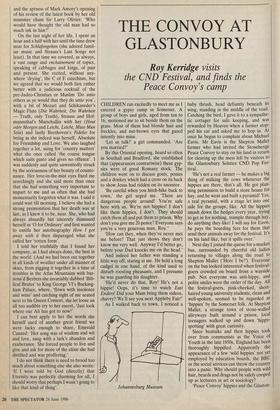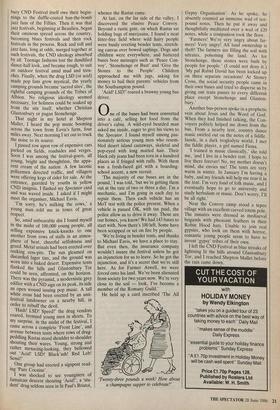THE CONVOY AT GLASTONBURY
Roy Kerridge visits
the CND Festival, and finds the Peace Convoy's camp
CHILDREN ran excitedly to meet me as I entered a gypsy camp in Somerset. A group of boys and girls, aged from ten to 16, motioned me to sit beside them on the grass. Most of them had blonde hair and freckles, and nut-brown eyes that gazed intently into mine.
`Let us talk!' a girl commanded. 'Are you married?'
By this Oriental opening, heard so often in Southall and Bradford, she established that (appearances contrariwise) these gyp- sies were of good Romany stock. The children went on to discuss goats, ponies and a donkey which had a cross on its back to show Jesus had ridden on its ancestor.
`Be careful when you hitch-hike back to town,' the girl urged me. 'There are dangerous people around! You're safe here with us. We're not hippies! I don't like them hippies, I don't. They should catch them all and put them to prison. Why don't you give me 20 pence? Everyone says you're a very generous man, Roy.'
`How can they, when they've never met me before? That just shows they don't know me very well. Anyway I'd better go, before your Dad knocks me on the head.'
And indeed her father was standing a little way off, staring at me. He held a long cudgel in one hand, of the kind used to disturb roosting pheasants, and I presume he was guarding his daughter.
`He'd never do that, Roy! He's not a hippie! Oops, it's time to watch East Enders! Did your Mum bring them videos, chavvy? We'll see you next Appleby Fair!'
As I walked back to town, I noticed a Johannesburg Museum baby thrush, head defiantly beneath its wing, standing in the middle of the road.
Catching the bird, I gave it to a sympathe- tic cottager for safe keeping, and was rewarded by Heaven when a farmer stop- ped his car and asked me to hop in. At once he began to complain about Michael Eavis. Mr Eavis is the Shepton Mallet farmer who had invited the Stonehenge Peace Convoy to stay on his land in return for clearing up the mess left by visitors to the Glastonbury Solstice CND Pop Fes- tival.
`He's not a real farmer — he makes a big thing of milking the cows whenever the hippies are there, that's all. He got plan- ning permission to build a store house for hay, and he went and built a pyramid! Yes, a real pyramid, with a stage let into one side for the groups, like. All the hippies smash down the hedges every year, trying to get in for nothing, trample through hay, do anything they like! I will say for Eavis, he pays the boarding fees for them that send their animals away for the festival. It's on his land like, but it spills over.'
Next day I joined the queue for a market bus, surrounded by cheerful old ladies returning to villages along the road to Shepton Mallet (`flere I be!'). Everyone on the bus looked interested when festival- goers crowded on board from a wayside pub. Not everyone was anti-hippy, and polite smiles were the order of the day. All the festival-goers, pink-cheeked, short- haired young university students, clean and well-spoken, seemed to be regarded as `hippies' by the Somerset folk. At Shepton Mallet, a strange town of stone-walled alleyways built around a prison, local teenagers walked up and down 'hippy- spotting' with great curiosity. Since beatniks and then hippies, took over from communists as the Voice of Youth in the late 1950s, England has been thoroughly hippified. Apparently the appearance of a few 'wild hippies' not yet employed by education boards, the BBC or the social services can throw the country into a panic. Why should people with wild hair, beards and drugs not be safely cooped up as lecturers in art or sociology?
`Peace Convoy' hippies and the Glaston- bury CND Festival itself owe their begin- nings to the duffle-coated ban-the-bomb jazz fans of the Fifties. Then it was that jazz festivals, beginning at Beaulieu, began their ominous spread across the country, becoming blues festivals and then rock festivals in the process. Rock and roll and jazz fans, long at odds, merged together at such festivals, the CND ideology absorbed by all. Teenage fashions lost the dandified dance-hall look, and became rough, to suit an outdoor festival amid mud and tren- ches. Finally, when the drug LSD (or acid) made pop fans grow mystical, the yearly camping grounds became 'sacred sites', the rightful camping grounds of the Tribes of Albion. No religious ideology seemed necessary, for holiness could be soaked up from the site itself, whether Christian Glastonbury or pagan Stonehenge. That night in my hotel at Shepton Mallet, I heard the pop music booming across the town from Eavis's farm, four miles away. Next morning I set out to track the noise to its source.
I passed row upon row of expensive cars parked on fields, roadsides and verges. Soon I was among the festival-goers, all young, bright and thoughtless, the appa- rent cream of the nation. A few laconic policemen directed traffic, and villagers were offering kegs of cider for sale. At the entrance, guarded by youths in yellow CND insignia, I flashed my Spectator card and was waved inside. I asked if I might meet the organiser, Michael Eavis. 'I'm sorry, he's milking the cows,' a young man 'told me in tones of great respect.
So, amid unbearable din I found myself in the midst of 100,000 young people, all selling expensive knick-knacks to one another from rows of stalls in an atmos- phere of heat, cheerful selfishness and greed. Metal urinals had been erected over reeking cess-pits. The sun gleamed on discarded lager tins, and the ground was worn into a baked desert. Expensive tents flanked the hills and Glastonbury Tor could be seen, affronted, on the horizon. There was the pyramid, a modernistic grey edifice with a CND sign on its peak, its side an open wound issuing pop music. A tall white cross had been erected by an anti- festival landowner on a nearby hill, in order to rebuff the devil.
'Hash! LSD! Speed!' the drug vendors roared, bronzed young men in shorts. To my surprise, in the midst of the festival, I came across a complete 'Front Line', and avenue between tents where rows of drug- peddling Rastas stood shoulder to shoulder shouting their wares. Young, strong and rather menacing-looking, they bellowed out 'Acid! LSD! Black'ash! Red Leb! Sensi!'
One group had erected a signpost read- ing 'Pure Cocaine'.
I was shocked to see youngsters of Jamaican descent shouting 'Acid!', a 'stu- dent' drug seldom seen in St Paul's Bristol, whence the Rastas came.
At last, on the far side of the valley, I discovered the elusive Peace Convoy. Beyond a rustic gate, on which Rastas sat holding bags of marijuana, I found a neat litter-free field where wild hairy people were busily erecting bender tents, stretch- ing canvas over bowed saplings. Dogs and children were everywhere, and battered buses bore messages such as 'Peace Con- voy', 'Stonehenge or Bust' and 'Give the Stones to the People'. Children approached me with jugs, asking for money to bail their parents' vehicles from the Southampton pound. 'Acid! LSD!' roared a brawny young bus driver.
0 ne of the buses had been converted into a café, selling hot food from the driver's cabin. A wild-eyed bearded man asked me inside, eager to give his views to the Specator. I found myself among pas- sionately serious young men who resem- bled desert island castaways, skeletal and pop-eyed with long matted hair. Their black oily jeans had been torn in a hundred places as if fringed with ruffs. With them was a fresh-faced girl with a boarding- school accent, a new recruit.
'The majority of our buses are in the pound,' I was told, 'but we're getting them out at the rate of two or three a day. I'm a mechanic, and I'm going in each day to repair them. Then each vehicle has an MoT test with the police present. When a vehicle is passed OK, with tax paid, the police allow us to drive it away. Those are our homes, you know! We had 143 buses to start with. Now there's 100 left. Some have been scrapped or set on fire by people. 'We're living in bender tents, and thanks to Michael Eavis, we have a place to stay. But even then, the insurance company wouldn't insure the festival unless he got an injunction for us to leave. So he got the injunction, and it's a secret that we're still here. As for Farmer Atwell, we were forced onto his land. We've been alienated from society for two years now. We're very close to the soil — look, I've become a member of the Romany Guild.'
He held up a card inscribed 'The All 'Twenty-three pounds a week! How about a champagne supper to celebrate?' Gypsy Organisation'. As he spoke, he absently counted an immense wad of ten- pound notes. Then he put it away and thoughtfully meditated over a wad of £20 notes, while a companion took the floor.
'Farmers! We're very angry about far- mers! Very angry! All land ownership is theft! The farmers are filling the soil with nitrates, poisoning the land. As for Stonehenge, those stones were built by people for people.' (I could not deny it.) 'My pal Rabid David has been locked up on three separate occasions! At Stoney Cross, the social security people came in their own buses and tried to disperse us by giving out train passes to every different place except Stonehenge and Glaston- bury.'
Another bus-person spoke in a prophetic vein about Jesus and the Word of God.
When they had finished talking, the Con- voyers politely helped me down from the bus. From a nearby tent, country dance music swirled out on the notes of a fiddle. Inside, in a dark troglodyte world, I met the fiddle player, a girl named Fiona.
'I trained in music classically,' she told me, 'and I live in a bender tent. I hope to live there forever! No, my mother doesn't mind, she envies me! The tents are very warm in winter. In January I'm having a baby, and my friends will help me rear-it in the tent. I'm very fond of folk music, and I eventually hope to go to university and study herbalism or music. Don't worry, I'll be all right.'
Near the Convoy camp stood a tepee village with an excellent carved totem pole. The inmates were dressed as mediaeval brigands with pheasant feathers in their Robin Hood hats. Unable to join real gypsies, who look on them with horror, romantic young people seem to have to invent 'gypsy' tribes of their own.
I left the CND Festival as blue streaks of lightning lit the hills around Glastonbury Tor, and I reached Shepton Mallet before the rain came down.



















































 Previous page
Previous page